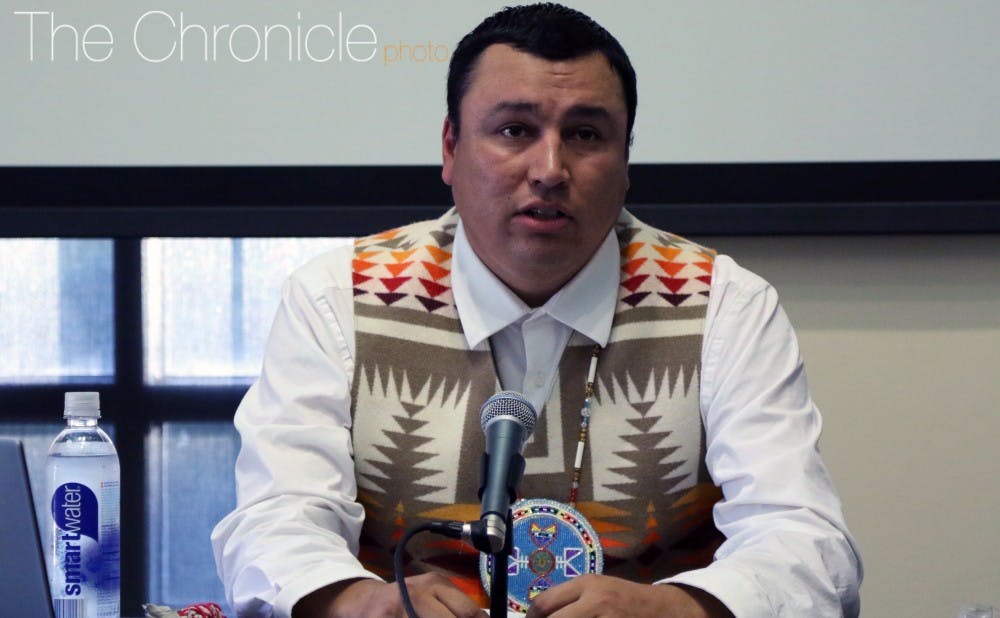Native American tribal council members from North Dakota showed students and community members the devastation that the Dakota Access Pipeline will have on natural resources and the indigenous people living in the area Thursday evening.
The Environmental Alliance and the Native American Student Alliance hosted an event that featured Chad Harrison, Sioux Tribe councilman-at-large, Cody Two Bears, Sioux Tribe district representative and Christine Folch, assistant professor of cultural anthropology. The Dakota Access Pipeline is a project that will transport oil more than 1,000 miles from northwest North Dakota to central Illinois but could negatively impact the environment and the economy of the Sioux Tribe. More than 100 people listened to the Harrison and Two Bears describe the protests against the pipeline in Standing Rock Indian Reservation.
“My ancestors come from the east side of the Missouri River and lived there for 125 years before 1862, when the Minnesota Uprising and the White Storm Hill Massacre moved us to the west side of the Missouri River,” Two Bears said. “The government once again is threatening our way of life. First, it was with our land in the 1800s, then it was our buffalo. Now, it's our water.”
Two Bears described a history of the United States government taking advantage of Native American land and people. Specifically, he explained how the government took the Black Hills in South Dakota from indigenous people because of gold there.
He noted that the government paid for the Black Hills land, but the Native American people have left the money in a bank collecting interest, and it is now worth $1 billion, none of which they have spent. He noted that it was not about the money for them, but their right to their land and natural resources.
“We are tired of being acceptable collateral damage,” Harrison said.
The Dakota Access Pipeline would cut across the Missouri River and various waterways, so a leak would pollute everything downstream, Harrison argued. It is proposed to be 30 inches in diameter and could transport 470,000 barrels of oil a day.
“85 percent of our bodies as human beings is water,” Two Bears said. “Why water is so important is because everything, water can nourish, not just us, but this planet, the animals. That's our way of life. All of it. That's why I feel so passionate about what's going on today. We also have to remember the four-legged and the winged ones. Who's going to speak for them? We've got to speak for them.”
Sophomore Shandiin Herrera, treasurer for NASA, said that the event was a perfect way to highlight Native American Awareness Month and the protests at Standing Rock. She explained that it had personal significance to her as a Native American student.
“For me, as a Native American and from a reservation, I feel like my transition to Duke has been very different,” Herrera said. “It's been difficult, but now, as I see all the recognition and support that Standing Rock is getting, I am finding out more that people at campuses like Duke are learning more about Native life."
Junior Jack McDermott, president of the Environmental Alliance, also noted that he thought the event was a success.
"The panelists engaged undergraduates, graduate students, faculty, and community members alike," McDermott wrote. "Together with NASA, we were able to inform the community about an incredibly significant and unprecedented event that is happening in real time."
Get The Chronicle straight to your inbox
Signup for our weekly newsletter. Cancel at any time.
Class of 2019
Editor-in-chief 2017-18,
Local and national news department head 2016-17
Born in Hyderabad, India, Likhitha Butchireddygari moved to Baltimore at a young age. She is pursuing a Program II major entitled "Digital Democracy and Data" about the future of the American democracy.

